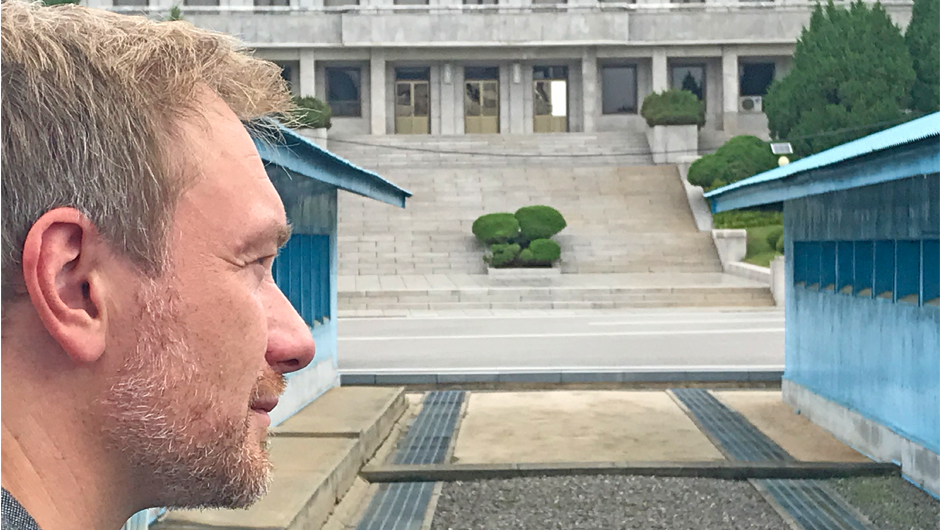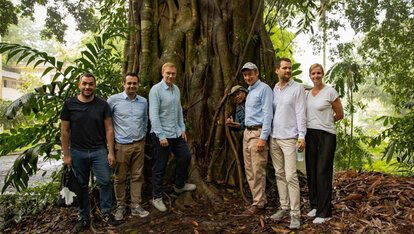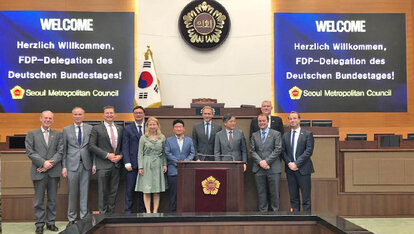Christian Lindner in Asia: Innovation, Environment, Security, and Society 5.0

Christian Lindner, Chairman of Germany´s Free Democratic Party (FDP), along with other members of the German Parliament, visited Kuala Lumpur, Hong Kong, Shanghai, Beijing, Seoul, and Tokyo.
The group’s first stop was Malaysia, which is on its way to democracy after the elections last year, which ended six decades of autocratic rule. Mr. Lindner was accompanied by MPs Gyde Jensen, Bijan Djir-Sarai, Johannes Vogel and Konstantin Kuhle. The group met with FNF partner Sisters in Islam, a civil society organization promoting the rights and emancipation of women within the Islamic community. They also toured Putrajaya, the Federal Administrative Centre of Malaysia, whose modern architecture accentuates Islamic art. Malaysia´s last election ushered in a new era of freedom expression. Lindner had a conversation with Steven Gan, the editor-in-chief and co-founder of news platform Malaysiakini, on press freedom. The delegation also sat down with Zunar, who is well-known for his cartoons that attack corrupt politicians. As climate change becomes a more contested issue in Germany, the members of parliament hiked through the rain forest and gained insights from the Forest Research Institute Malaysia (FRIM), one of the leading institutions in tropical forestry research in the world.

At the Forest Research Institute Malaysia (FRIM)
Asia: The most dynamic region
Among the highlights of the visit was Lindner’s attendance to the opening of FNF Global Innovation Hub in Hong Kong. “Asia is the most dynamic region in the world, and we can benefit from this dynamism,” said Lindner. “Innovation comes from here. This office in Hong Kong can easily facilitate the exchange of ideas between the region and Germany,” he added. In the latest Global Innovation Index Report, Asia is in the top three in terms of innovation economies. Singapore is ranked 3, Hong Kong is ranked 13, and mainland China has entered the top 20 for the first time. During the same event, Lindner met with “digital change-makers” - technology mavens and startup experts from all over the globe who were gathered together in Hong Kong by the Innovation Hub. Lindner also launched FNF’s augmented reality app, a tool to know more about the work of the Foundation in Southeast & East Asia.
The FNF Global Innovation Hub reinforces the Foundation’s claim that it is the creative innovation platform for the promotion of freedom. “Our ‘practitioner’s trinity’ for innovation means working on and with innovation, and being innovative. We work on hot topics and employ innovative methods, and along the way putting creativity into practice,” said Armin Reinartz, Head of FNF Global Innovation Hub.
Regional power and security
The delegation continued their trip to Shanghai and, by fast train, to Beijing. Coming from a visit to e-Mobility Startup Nio, Lindner later posted on his Facebook page that “new challengers are coming to German car manufacturers, which we should not underestimate.”
The emergence of China as a regional and global power has until recently paved the way for more support to private entrepreneurs towards developing an innovation-driven economy. The group visited NIO, a newly emerged car company that designs and develops smart, high-performance, electric vehicles, and ByteDance, an internet technology company operating several machine learning-enabled content platforms. They also met with representatives from the All-China Federation of Industry and Commerce (ACFIC).
From China, most of the delegation flew back to Germany while Lindner went on to South Korea, where was joined by a new batch of FDP-MPs: Daniela Kluckert, Alexander Kulitz, Oliver Luksic and Mario Brandenbrg. They visited the Demilitarized Zone (DMZ) just days after Donald Trump and Kim Jong-un had met there. “If stability would be lost here, the effects would reach us, too,” remarked Lindner.
Smart Cities and Society 5.0
A day later, in Seoul, smart city issues were on the agenda. “Citizens and the local government are ‘digital twins’ in smart cities. Technology connects them, and they witness each other grow,” pointed out Hwang Jie-Eun, Chair of the Department of Architecture at the University of Seoul. She showed the delegation around at Sewoon Sanga Complex, a prime example of the value of citizen engagement and the effectivity of the concept of bottom-up approach in urban regeneration.

At Seoul Metropolitan Council
In Japan, more discussions about technology transpired, including about Society 5.0 and the digital transformation Japan is undertaking. The group explored the NEC Future Creation Hub, a showcase of Japan’s latest technology.
The Asian visit took place from July 5 to 20, 2019.